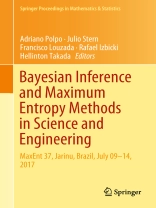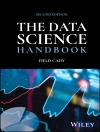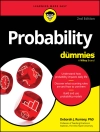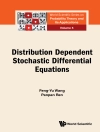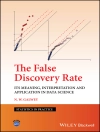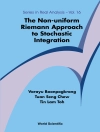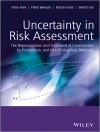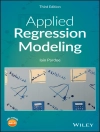These proceedings from the 37th International Workshop on Bayesian Inference and Maximum Entropy Methods in Science and Engineering (Max Ent 2017), held in São Carlos, Brazil, aim to expand the available research on Bayesian methods and promote their application in the scientific community. They gather research from scholars in many different fields who use inductive statistics methods and focus on the foundations of the Bayesian paradigm, their comparison to objectivistic or frequentist statistics counterparts, and their appropriate applications.
Interest in the foundations of inductive statistics has been growing with the increasing availability of Bayesian methodological alternatives, and scientists now face much more difficult choices in finding the optimal methods to apply to their problems. By carefully examining and discussing the relevant foundations, the scientific community can avoid applying Bayesian methods on a merely ad hoc basis.
For over 35 years, the Max Ent workshops have explored the use of Bayesian and Maximum Entropy methods in scientific and engineering application contexts. The workshops welcome contributions on all aspects of probabilistic inference, including novel techniques and applications, and work that sheds new light on the foundations of inference. Areas of application in these workshops include astronomy and astrophysics, chemistry, communications theory, cosmology, climate studies, earth science, fluid mechanics, genetics, geophysics, machine learning, materials science, medical imaging, nanoscience, source separation, thermodynamics (equilibrium and non-equilibrium), particle physics, plasma physics, quantum mechanics, robotics, and the social sciences. Bayesian computational techniques such as Markov chain Monte Carlo sampling are also regular topics, as are approximate inferential methods. Foundational issues involving probability theory and information theory, as well as novel applications of inferenceto illuminate the foundations of physical theories, are also of keen interest.Mục lục
Ariel Caticha, Quantum phases in entropic dynamics.- Ali Mohammad-Djafari, Bayesian Approach to Variable Splitting – Link with ADMM Methods.- Afonso Vaz, Prior shift using the Ratio Estimator.- Camila B. Martins, Bayesian meta-analytic measure.- Diego Marcondes, Feature Selection from Local Lift Dependence based Partitions.- Dirk Nille, Probabilistic Inference of Surface Heat Flux Densities from Infrared Thermography.- Donald Spector, Schrödinger’s Zebra: Applying Mutual Information Maximization to Graphical Halftoning.- Geert Verdoolaege, Regression of Fluctuating System Properties: Baryonic Tully-Fisher Scaling in Disk Galaxies.- Hellinton Takada, Bayesian Portfolio Optimization for Electricity Generation Planning.- Jony Pinto Junior, Bayesian variable selection methods for log-Gaussian Cox processes.- Keith Earle, Effect of Hindered Diffusion on the Parameter Sensitivity of Magnetic Resonance Spectra.- Leandro Ferreira, The random Bernstein polynomial smoothing via ABC method.- Nestor Caticha, Mean Field studies of a society of interacting agents.- Marcio Diniz, The beginnings of axiomatic subjective probability.- Mircea Dumitru, Model selection in the sparsity context for inverse problems in Bayesian framework.- Milene Farhat, Sample Size Calculation using Decision Theory.- Nathália Moura, Utility for Significance Tests.- Paulo Hubert, Probabilistic equilibria: a review on the application of MAXENT to macroeconomic models.- Paulo Hubert, Full bayesian approach for signal detection with an application to boat detection on underwater soundscape data.- Patricio Maturana, Bayesian support for Evolution: detecting phylogenetic signal in a subset of the primate family.- Rafael Catoia Pulgrossi, A comparison of two methods for obtaining a collective posterior distribution.- Rafael Console, A nonparametric Bayesian approach for the two-sample problem.- Thais Fonseca, Covariance modeling for multivariate spatial processes based on separable approximations.- Roberta Lima, Uncertainty quantification and cumulative distribution function: how are they related?.- Robert NIVEN, Maximum Entropy Analysis of Flow Networks with Structural Uncertainty (Graph Ensembles).- Roland Preuss, Optimization employing Gaussian process-based surrogates.- Robert NIVEN, Bayesian and Maximum Entropy Analyses of Flow Networks with Gaussian or non-Gaussian Priors, and Soft Constraints.- Wesley Henderson, Using the Z-order curve for Bayesian model comparison.
Giới thiệu về tác giả
Adriano Polpo, Ph.D., is an Associate Professor of Statistics at the Federal University of Sao Carlos (UFSCar, Brazil). He received his B.Sc. in Statistics from the State University of Campinas, his Ph.D. in Statistics from the University of Sao Paulo, and he was Research Associate at Florida State University. He is the coordinator of the research group GIS (Group of Inductive Statistics), and is the coauthor of more than 30 publications in statistical peer-reviewed journals, books, and book chapters. Dr. Polpo has served as Head of the Department of Statistics at UFSCar and President of the ISBr A (the Brazilian Chapter of the International Society for Bayesian Analysis).
Julio Michael Stern, Ph.D., is a Full Professor at the IME-USP (Institute of Mathematics and Statistics of the University of Sao Paulo) and Research Fellow of the CNPq (Brazilian National Council for Science and Technology). He received his B.Sc. and M.Sc. in Physics from the University of Sao Paulo, his Ph.D. in Operations Research from Cornell University, and his Liv.Doc. in Computer Science from the University of Sao Paulo. He was President of the ISBr A (Brazilian Chapter of the International Society for Bayesian Analysis) from 2010 to 2012 and the organizer of Max Ent 2008. He has published several books and articles in the areas of Epistemology and Logic, Mathematical Modeling and Operations Research, Statistical Theory and Methods, and Sparse and Structured Systems.
Francisco Louzada, Ph.D., is a Full Professor of Statistics at the Department of Applied Mathematics and Statistics, University of Sao Paulo (ICMC-USP, Brazil); Research Productivity Fellow of the Brazilian founding agency CNPq, Level 1; Director of the Center for Risk Analysis (CER); Director of the Center for Applied Mathematics and Statistics in Industry (Ce MEAI); Director of Technology Transfer, and Executive Director of External Relations at the Center for Research, Innovation and Dissemination of Mathematical Science in Industry (CEPIDCe MEAI). He received his Ph.D. in Statistics from the University of Oxford. Dr. Louzada is the author or coauthor of more than 200 publications in statistical peer-reviewed journals, books, and book chapters. He has supervised more than 100 assistant researchers, post-docs, graduate students, and undergraduates.
Rafael Izbicki, Ph.D., is an Assistant Professor of Statistics at the Federal University of Sao Carlos (UFSCar, Brazil). He received his Ph.D. in Statistics from Carnegie Mellon University (CMU, USA) and his B.A. from the University of Sao Paulo (IME-USP, Brazil). He has published several papers in the areas of machine learning, nonparametric statistics, foundations of statistics, decision theory, Bayesian statistics, and high-dimensional inference.
Hellinton Hatsuo Takada, Ph.D., is Vice President of Quantitative Research at Itaú Asset Management andis co-founder and director of Blitz-Trading. Additionally, he is a Professor at the Institute of Management Foundation (FIA, Brazil), the Assunção University Center-Pontifical Catholic University (UNIFAI-PUC, Brazil) and the Carlos Drummond de Andrade Group (GCDA, Brazil). He received his B.S., M.A., and Ph.D. degrees in Engineering from the Aeronautical Institute of Technology (ITA, Brazil), and he did his post-doctorate at the Institute of Mathematics and Statistics of the University of São Paulo (IME-USP, Brazil). He is certified with CPA-20 and CGA from the Brazilian Financial and Capital Markets Association (ANBIMA, Brazil) and has a Certificate in Quantitative Finance (CQF) from CQF Institute, UK. His research interests include finance, macroeconomic modeling, Bayesian statistics, information theory, and numerical optimization.
